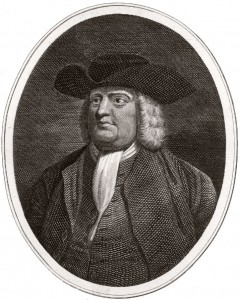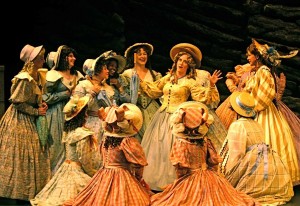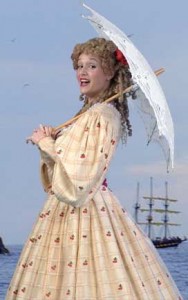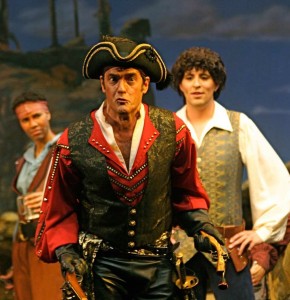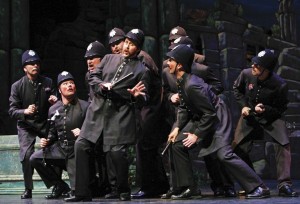When William Penn established a household in Philadelphia, he invited his father’s two unmarried sisters to come to the Colonies and keep house for him. The two ladies had felt lonely in England ever since William’s father had died and were delighted to accept.
Their various duties included responsibility for both cooking and hostessing the frequent dinner parties William held. They enjoyed this aspect very much and took great pride in the excellence of their dinners. In particular every dinner ended with a choice of two or three different pies, which were so delicious that guests would insist on sampling all of them.
Word about the pies spread rapidly throughout Philadelphia. Prominent people began inviting William to their parties, hoping for a reciprocal invitation. Invitations would include the two Misses Penn with a hint that it would not be taken amiss if they brought along a pie or two.
At first the two sisters were flattered with this approval and happy to oblige. However, they soon realized that they had a valuable asset here, so they announced that their pies were now for sale at a penny a pie.
[ Ed: Isn’t this is supposed to be an opera review?Opera Nut: Be patient. I’m getting there]
Business boomed from the start. Orders came in faster than they could bake pies, and in no time at all they had a substantial backlog. Shrewd capitalists that they were, they doubled the price to tuppence.
Buyers hardly noticed. The backlog continued to grow. They upped the price to sixpence and then two pies for a shilling. Finally they were charging a shilling for each pie.
This last raise was too much. Only the super-rich, the ostentatious, the aristocrats could now afford these delicious pies. People complained. They complained vocally. They wrote letters to each other – and to the newspapers. Politicians railed against this abuse of privilege. In fact, up and down the colonies from Boston to Charleston, a major topic of conversation – a veritable cause c�l�bre – was
The Pie Rates of Penn’s Aunts
So now, let’s talk about
The Pirates of Penzance
This second full-length opera by W. S. Gilbert and Sir Arthur Sullivan was first produced in 1879 and has been going strong ever since. The Lamplighters Music Theatre has been producing Gilbert & Sullivan operas in San Francisco since 1952, but this year they decided to take their production of Pirates to nearby Mountain View for two performances. When Sara and I first got that news our only question was do we go Saturday night or Sunday matinee? We chose Saturday, August 14 and had a delightful time.

Soloists and chorus alike did full justice to Sullivan’s wonderful music and to Gilbert’s witty lines. Supertitles were shown, but they were totally unnecessary. Every word, every syllable was sung with precision so one did not miss any of the wonderful rhymes such as:

Jonathan Spencer as the very model of a modern Major-General. Photo by Kersti Malvre Fine Art Photography
Jonathan Spencer as Major-General Stanley singing:
About binomial theorem I’m teeming with a lotta news,
With many cheerful facts about the square of the hypotenuse;
The chorus of daughters cattily singing:
The question is had he not been a thing of beauty
Would she be swayed by quite a keen a sense of duty?
The chorus of pirates with the increasingly inspired rhymes of:
Here’s a first rate opportunity
To get married with impunity,
To indulge in our felicity
Of unbounded domesticity;
We shall quickly be parsonified,
Conjugally matrimonified,
By a Doctor of Divinity
Who is located in this vicinity;
Or Sara Couden as Ruth with:
A nursery maid
Is not afraid
Of what you people call work,
So I made up my mind
To come as a kind
Of piratical maid of all work
All of the principals sang, acted, and looked their parts. Brett Ruona was a lovely young Mabel with a sweet voice and, true to the part, not a great deal of personality.
Joshua LaForce’s Frederic was very tall, very na�ve and appeared totally flabbergasted when confronted with That paradox, that paradox, that most ingenious paradox. Charles Martin made a most convincing Pirate King.
The Policemen led by Sergeant Chris Shuford were all excellent. Modern audiences may not share the G & S view that there is something innately ludicrous about a 47-year old female having amorous inclinations, but, hey, there are so many aspects of any opera for which one must suspend disbelief. Anyhow, Sara Couden’s Ruth was indeed ludicrous as she pawed over young Frederic. Finally, Jonathon Spencer played the preposterous Major-General Stanley with just the right degree of understatement.
And it was a real pleasure to see such a professional production. A few years ago the Stanford Savoyards put on a production that was amusing but seemed more “Stanford” than “Savoyards”. And years ago I had gone to a performance in San Jose by a company which shall remain mercifully nameless which was a total disaster. But this production was just right. The choreography of Erica Smith was perfect. Maestro Monroe Kanouse set a brisk pace but the orchestra never dominated the singers. Peter Compton’s sets were, of course, impressive but not overpowering.
Even the printed program was above average. In addition to the usual synopsis, there was a short history with some interesting facts about theatrical piracy, and a full page of glossary for those audience members born after the 19th century who might not otherwise have known that Emeutes were “riots” and a Ravelin was a “detached outer-work for protecting the ramparts of a fort”. With over 4 dozen entries in the glossary I find it easy to forgive them for not knowing that Sat a gee was slang for being astride a horse.
I do have one cavil with the program however. Lamplighters double-casts most major roles, as do many local and regional opera companies, but the program only lists the two performers in alphabetical order with no indication of which one is singing at a particular performance. The thumbnail pictures accompanying the very complete “Meet the Lamplighters” section are not much help because they are so tiny and they are all-purpose headshots without stage wigs or makeup. Thanks to Joanne Kay in the Press Room on the Lamplighter’s website I finally got it all straight, but all audience members should have that information.
Good news if you live in the Bay Area. This peripatetic Lamplighter’s troupe will be performing The Pirates of Penzance throughout the rest of this month:
August 19-23 in San Francisco at Yerba Buena Center
August 27-29 at Bankhead Theater in Livermore.
Believe me, it’s worth a bit of a drive to go see it.
The Opera Nut
This review by Philip G Hodge appeared in sanfranciscosplash.com on August 17, 2010.

